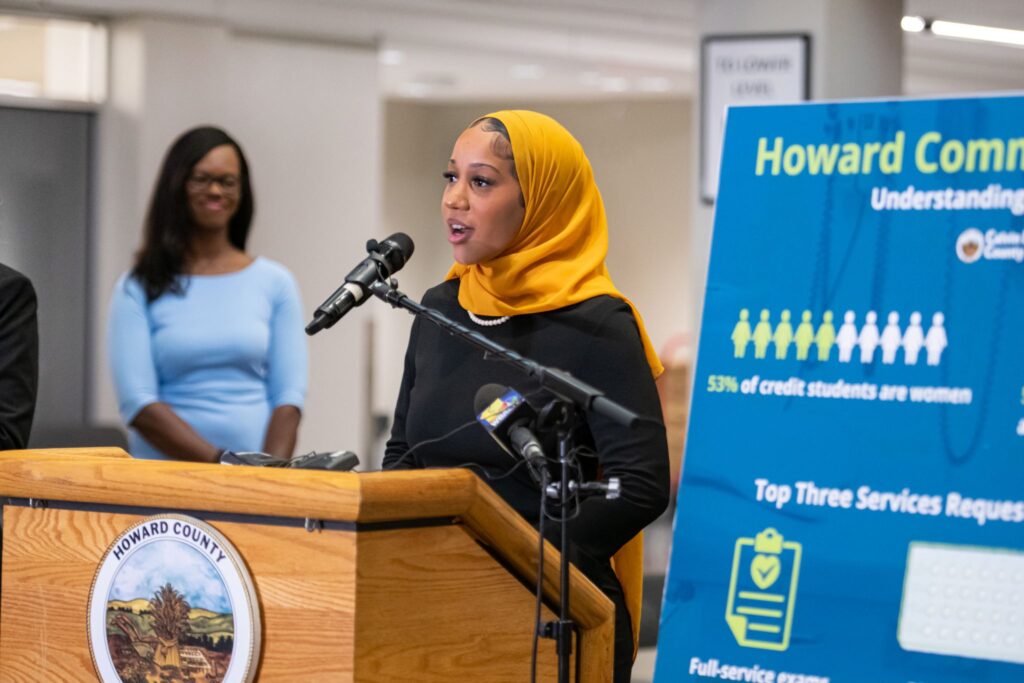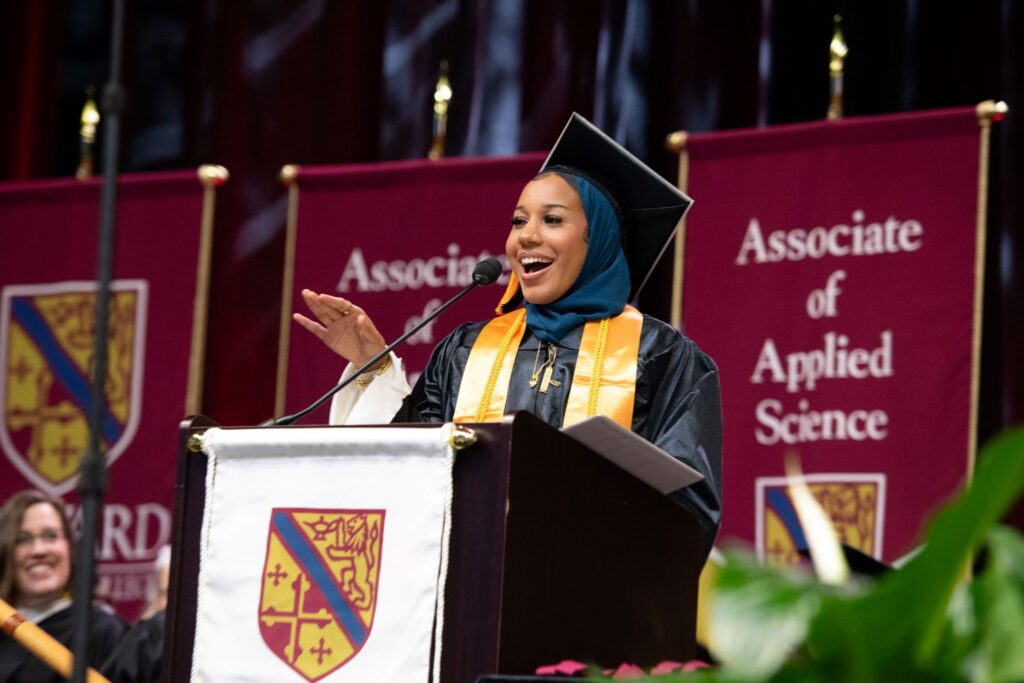A Q&A with Cooke Transfer Scholar Israah Ansari

Israah Ansari, a 2023 Cooke Transfer Scholar, is a senior psychology and political science major at Johns Hopkins University. Passionate about social justice and education policy, Israah is an active member of her community and is committed to enacting change on her campus. One of these ways is through the Stavros Niarchos Foundation (SNF) Agora Institute, a forum for improving democracy through civic engagement and dialog.
Israah was recently the keynote speaker at the 2024 Martin Luther King, Jr. holiday celebration hosted at her alma mater, Howard Community College. The Howard County Government chose her based on her accomplishments and other speaking engagements she had while she studied at HCC before becoming a Cooke Scholar. During her time at HCC, she was president of student government where she started the community college’s first ever homecoming celebration, and made sure students had safe spaces on campus to talk about issues in diversity, equity, and inclusion.
She has also recently joined Sova’s Beyond Transfer Policy Advisory Board, an organization dedicated to improving equity for community college students through transfer credit mobility and fairer policies at four-year colleges.
In the following Q&A, she touches on her keynote speech, being a transfer student, as well as being a Muslim woman of color on a college campus.

Q: What was it like to deliver the keynote speech this year at Howard Community College? What experiences and memories did you reflect upon when writing your speech?
A: Bittersweet. During rehearsals for the Martin Luther King Celebration, each presenter had gone on stage to practice their words and ensure their comfort behind the podium. When it was my turn to do so, the director asked me, “All good? Do you want to run through anything?” I jokingly responded, “I mean I’ve presented on this stage multiple times, I think I’ll be okay.” While the team laughed and I walked off stage, I felt both sadness and pride to be in that position. The Howard County Government MLK Commission shared that they chose me as the speaker after seeing my speech for Howard Community College’s 2023 Commencement. I was grateful to have been recognized for my talents and excited to finally feel like I made it, that my thoughts and words meant something and could positively alter audiences’ hearts and minds. But I was also broken about no longer being able to present on that stage countless times, no longer being a student at HCC.
I miss the memories, opportunities, and relationships that came with my time in community college. It was genuinely one of the best eras of my existence and I will forever owe my accomplishments today to the growth I experienced during those days. I reflected on just that when writing the keynote speech. I referenced a few of my civic engagement learnings from the Hopkins SNF Agora Institute which made me truly realize how far I have come from being SGA President at HCC and wanting to be a public speaker, to being a junior at Johns Hopkins University getting recognized by Congressman Sarbanes, serving on a Policy Advisory Board, and being invited back to my old institution to speak for the Howard County Government.
It felt like I blinked and everything changed, and it didn’t hit me until then. Life moves very fast and not enough people take the time to even notice where they are, let alone enjoy it. This is something I am working on now.
Q: How do you make the time to contribute to so many incredible organizations when you’re a full-time student? Do you have any advice for juggling community involvement with other responsibilities?
A: When I first got to Johns Hopkins, I wanted to do everything. I felt like it would be a waste of my amazing scholarship and prestigious institution to graduate without having excelled in every element Hopkins, and the world, have to offer. Because of this, I very quickly felt stuck and even sad in my schooling and career. It was around this time that I had lunch with the Chief of Staff for Hopkins’ Student Services, Lee S. Hawthorne, who not only reminded me that I cannot effectively “do it all” but also told me that whatever I do end up doing should be new and important to me. In other words, I needed to try different things that would fuel my passions whilst benefiting the world around me.
It seemed like I was learning the term “prioritize” for the first time ever. There was so much I wanted to participate in but only a few of those things were actually exciting and fulfilling. The wonderful organizations and institutions that I am currently engaged in all genuinely mean something to me, so I prioritize them over other things. My sincere connection to them does not make contributing time easier, but it makes it rewarding and that is what matters. My advice to others who are in a similar situation is to know your scale and what you like. Understand that while the sky is the limit, you cannot reach that limit all at once. Start with the things you want to do the most and make the best out of them. And if you’re not sure about what you want to do or what you like, start with something new, just make sure it feels good and yields good.
Q: Who are the women in your life that you look up to? Are there any historical figures that you would consider role models?
A: Although she is younger than me (and shorter), I admire and look up to my little sister, Buruj Ansari. She is so wise and strong, much more than I was when I was 17. I respect her constant efforts to better herself and the way she stands her ground with her likes and dislikes. I also always turn to her for emotional and religious guidance. She’s so present in her own life and aware of herself, if that makes sense, and she’s always seeking more knowledge and skills. Buruj constantly shows up for me, and she doesn’t even know how much her presence motivates me to succeed so that I can give her a better life as her older sister.
One historical figure I view as a role model is Nusaybah bint Ka’ab Al Maziniyyah. Nusaybah was the first woman warrior in Islam as she believed that women had the same duty to defend their religion as men. She fought in several battles alongside and in defense of her male counterparts, and was praised for her struggle and courage. Nusaybah is a role model to me because as a Muslim woman of color, I am often told by others that there is no place for someone like me in politics, that I would not be accepted or respected.
During Nusaybah’s time, women were not involved in battle at all, but she believed in what she was fighting for and felt she had to make a difference. Whenever I face discouragement in my plans, I remember her. Just because I may not look, speak, or think like the majority of people in a particular room does not mean I should not enter it. I believe in the work I am doing and know I have the ability to make change. And I hope to one day be honored like Nusaybah for the greatness I bring to my field despite my differences.
Q: Why are you passionate about improving outcomes for transfer students? What was the transfer process like for you at Johns Hopkins?
A: I am passionate about improving outcomes for transfer students for the same reason that I am passionate about improving outcomes for low-income students, students with social or psychological difficulty, students with food insecurity, students without access to opportunities: because I can relate. I truly believe that my purpose in this world is to use my experiences to better the experiences of others, ensuring that they never face the hardships I did and creating situations for them that I once wished I could have been in.
Everybody has a story, and it would be a shame if I did not make something of mine. My transition to Hopkins was probably top five on my “Biggest Challenges” list. I struggled socially, academically, emotionally, and physically. Credit processing aside– which took forever, by the way– I faced great difficulty in finding community, sleeping and eating, being active on campus, managing my workload, and battling the inescapable Imposter Syndrome. Vital aspects of the transfer process, like socioemotional well-being, often go unnoticed by institutions but have grave impacts on students’ personal, academic, and professional success.
I am now able to work on these elements with members of JHU’s administration and the Beyond Transfer Policy Advisory Board, but that didn’t come without me having to constantly pick myself back up after falling. My goal now is to help hold others upright so that they never fall like I did, and if they do, I will be right there to pick them back up. I also owe it to my lovely Cooke Foundation Dean of Scholar Support, Mylynh Nguyen, and JHU Success Coach, Dr. William Darryl Allen, for being there to pick me up and giving me the strength to be able to do the same for myself and those around me.